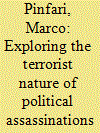| Srl | Item |
| 1 |
ID:
091269


|
|
|
|
|
| Publication |
2009.
|
| Summary/Abstract |
This paper reassesses the suggestion, advanced among others by David George, that the 1858 failed attentat by the Italian patriot Felice Orsini against Napoleon III can be considered as a paradigmatic instance of "terrorist assassination." Drawing on a new interpretation of the acts of Orsini's trial, the paper argues that Orsini's motivations were to a large degree "idiosyncratic"; however, it also discusses evidence suggesting that the significant collateral damage caused by the attack was, in Orsini's mind, one of the aims of the action and cannot be portrayed as unintended.
|
|
|
|
|
|
|
|
|
|
|
|
|
|
|
|
| 2 |
ID:
121507


|
|
|
| 3 |
ID:
154977


|
|
|
|
|
| Summary/Abstract |
Political assassinations can dramatically impact political and social dynamics, especially in times of violent political conflicts or electoral competition. The current study explores if and how specific social and political events facilitate the occurrence of political assassinations. After an examination of the logic of political assassinations, a theoretical framework is presented, which explains the role of civil wars and electoral processes as facilitators of different types of political assassinations. The theory is tested via a dataset of political assassinations worldwide between the years 1946–2013. The findings confirm that different sets of structural and contextual factors facilitate assassinations against heads of state, legislators, and leaders of opposition movements/parties. In addition, the findings illustrate the tendency of elections, especially in nonliberal settings and in polarized societies, to facilitate political assassinations rather than to calm the political environment. In contrast, civil wars have a more limited impact on the probability of assassinations, and their intensity and endurance mainly enhance the risk of assassinations of legislators.
|
|
|
|
|
|
|
|
|
|
|
|
|
|
|
|